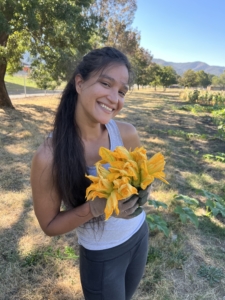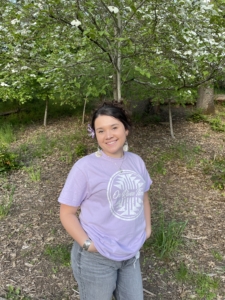(Ashland, Ore.) — Southern Oregon University has been awarded a $1 million grant from the Oregon Department of Energy to expand solar power production on campus, in the next step toward its ambitious goal of becoming the first college or university in the U.S. to generate 100 percent of the electricity used on campus.
The award from ODE’s Community Renewable Energy Grant Program will add solar arrays to The Hawk Dining Commons and the Lithia Motors Pavilion/Student Recreation Center complex, and will pay for the installation of battery storage at the Hawk to support students, first responders and the broader community, if needed.
“This is a tremendous opportunity for SOU, and for our students and the Ashland community,” SOU President Rick Bailey said. “This grant supports our campus-wide efforts to expand sustainability as an integral part of our everyday operations. It also is a significant milestone in our entrepreneurial mission to reduce costs and broaden revenue, easing the financial burden on students and their families.”
Solar energy production is a key element of SOU’s innovative plan to develop new revenue streams and reduce dependence on the two traditional funding sources for public higher education nationwide – tuition and state funding. The proportions of funding from those two sources has flipped over the past 25 years in Oregon, from two-thirds state money and one-third tuition, to exactly the opposite.
Energy self-sufficiency will save SOU at least $700,000 per year in utility costs and President Bailey plans to expand the program from there, with additional solar installations that will enable the university to generate income by selling electricity to local utilities. He achieved that on a smaller scale at Northern New Mexico College, where he served as president before being hired at SOU in January.
SOU is also awaiting confirmation of a $2 million federal grant for its campus-wide solar build-out. Oregon’s U.S. senators, Jeff Merkley and Ron Wyden, have placed SOU’s request in the senate’s draft appropriations bill for the 2023 fiscal year, which is currently in a process known as “Congressionally Directed Spending.” The federal grant, if awarded, will pay for additional solar arrays on SOU’s parking lots and rooftops.
For the state grant that was awarded this week, SOU submitted its application in July for $1 million toward a project that will cost a total of $1.34 million. It is considered both a community renewable energy project and a community energy resilience project, under the definitions of ODE’s Community Renewable Energy Grant Program.
The program was created by the 2021 Legislature, which set aside $50 million for projects throughout the state over the next three years – with $12 million available in the 2022 funding cycle. The program – open to Oregon tribes, public bodies and consumer-owned utilities – drew a total of 56 applicants who submitted 68 applications, with 20 projects awarded grants in the program’s first round.
“These new solar projects at SOU will take our efforts to the next level,” SOU Sustainability Director Becs Walker said. “We are pursuing all viable opportunities to generate renewable energy on campus. This will help us financially as well as set us on the pathway to achieve carbon neutrality. Our university is helping to lead the way for our community, region and the state of Oregon.”
SOU chose the Hawk Dining Commons and Lithia Motors Pavilion/Student Recreation Center projects for this year’s state funding based on site readiness, community resiliency and public welfare factors. SOU will continue to implement energy conservation and energy efficiency measures as it increases its solar.
The university currently has nine solar arrays on its Ashland campus with a total output of 455 kilowatts, plus an array at the Higher Education Center in Medford and a pole-mounted array installed last year by a nonprofit on land leased from SOU. The two new arrays supported by the state grant will increase SOU’s solar capacity by a total of 359 kilowatts.
SOU’s first solar array – a 6 kilowatt project with 24 solar panels – was installed on the Hannon Library in 2000. A total of five new arrays have been added in just the past three years, in projects funded through a combination of private investors, grants, the student body and the university. SOU’s Hawk Dining Hall & McLoughlin Residence Hall each have solar hot water systems installed to augment the natural gas domestic water heating, and the campus also has three net-zero buildings – they create as much or more energy than they use.
Solar energy production is one of four opportunities that SOU is currently pursuing in its effort to be more entrepreneurial in its approach to revenue generation. The university has also initiated a project to raze its vacant Cascade housing complex, which was completed in the early 1960s, and replace it with an innovative senior living facility that produces synergy between its residents and the university. Funding for the demolition has been approved by the state and is expected to begin in the next few months.
Other projects that will produce revenue or reduce expenses for SOU include the establishment of a University Business District in southeast Ashland – discussions are underway with the local business community – and replacement of its operational software with the cutting-edge Workday platform, which eventually will save the university about $750,000 per year in recurring costs.
The projects are part of an effort to “re-engineer” SOU’s financial structure, reducing expenses to better reflect current enrollment and academic interests, expanding revenue sources and positioning the university for strategic growth into the future.
-SOU-










 The NAS program will use the grant from Banyan to hire SOU alumna T Tschantre, who is of Tewa descent, to support participation in growth of Dragonfly’s Garden and to tend the plot with student intern Alanis Baldy, a citizen of the Hoopa Valley Tribe.
The NAS program will use the grant from Banyan to hire SOU alumna T Tschantre, who is of Tewa descent, to support participation in growth of Dragonfly’s Garden and to tend the plot with student intern Alanis Baldy, a citizen of the Hoopa Valley Tribe. Baldy and other NAS students were inspired by the success of Rose’s three sisters garden, and mobilized to use the technique on a garden plot – which would become known as Dragonfly’s Garden – in the SOU Community Garden. The community garden is a student-run organic cooperative at the corner of South Mountain Avenue and Henry Street.
Baldy and other NAS students were inspired by the success of Rose’s three sisters garden, and mobilized to use the technique on a garden plot – which would become known as Dragonfly’s Garden – in the SOU Community Garden. The community garden is a student-run organic cooperative at the corner of South Mountain Avenue and Henry Street.